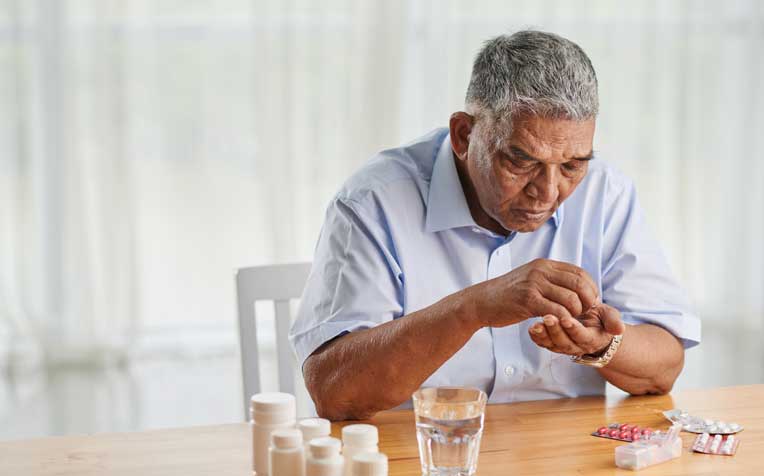
Keeping a list of medicines, including supplements taken, is useful especially when consulting the doctor.
Incorrect medicine consumption habits such as forgetting to take certain medicines may possibly lead to side effects.
Although the doctor gave him tablets to protect his stomach from the possible side effects of his blood-thinning medicine, Mr T continued to complain of gastric pain.
After his doctor questioned him closely, Mr T admitted that he hadn’t been following the instructions given – the instructions for the several drugs he had to take every day were simply too much to remember.
Mr T takes four types of medication: aspirin, a blood-thinning tablet taken after breakfast; two omeprazole capsules, taken before breakfast to protect his stomach against the side effects of aspirin; enalapril, taken twice a day to lower his blood pressure; and isosorbide dinitrate, taken three times daily for his heart condition.
Mr T isn’t a real patient, but what he went through is not uncommon. According to a 2004 study done on nursing homes in Singapore, nearly two-thirds of the elderly patients were on five or more medicines, and 70 per cent had medication-related problems, such as taking the wrong dosage or taking medicine they weren’t supposed to consume.
“If you are taking only one or two medicines, it’s quite easy to remember how to take them and when to take them. But when the list goes on, it gets quite hard to remember and patients would either forget or not want to take all their medicines,” said Ms Shannon Ng, Pharmacist, Pharmacy Department, Singapore General Hospital (SGH), a member of the SingHealth group.
“Taking eight to 20 tablets a day isn’t uncommon for our older patients.”
Medication-related problems - a growing concern
Medication-related problems are increasingly a concern, especially as Singapore’s population ages. Older patients tend to suffer from chronic diseases such as diabetes and heart-related conditions.
“A person who is first diagnosed with diabetes may be given one type of medicine for a start. If his condition isn’t well controlled, he may be given several more drugs later and/or insulin therapy where he has to inject insulin into himself regularly,” said Ms Ng.
More people today are also taking herbal supplements and vitamins. While these are billed as natural or from plants or vegetables, they can interact with the medicines patients are taking or duplicate their effects, sometimes with dangerous consequences.
For instance, calcium taken with some types of antibiotics can reduce the effectiveness of the antibiotics. Calcium tablets should be taken two hours before or after taking the antibiotic ciprofloxacin, said Ms Ng.
A drug that interacts with many other types of medicine is warfarin, which is used to prevent blood clot formation and stroke in patients with some heart conditions. If a patient on warfarin therapy goes to see a GP for flu and doesn’t tell the doctor that he is on the drug, he may be prescribed an antibiotic that can interact with warfarin and increase the risk of bleeding.
To prevent accidents caused by taking medicines incorrectly, it is important for patients to take ownership of their medicines and that means knowing their names, what they are for, their usage and common side effects, said Ms Ng. Keeping an updated list of the medicines, including supplements and herbal or natural extracts, is also useful when consulting a doctor, especially if the patient sees different doctors for different conditions.
“Many patients don’t know the names of the drugs they are taking, or how much they are supposed to take. When asked to describe what they are taking, they might say a white tablet. But there are so many medicines in the form of white tablets,” said Ms Ng.
Patients can make use of medication management services, offered by polyclinics, hospitals and retail pharmacies, to sort out their medication. All drugs, including prescription and over-the-counter medication, herbal products as well as supplements, should be shown to the pharmacist, who looks out for duplicate or mismatched drugs, those which are no longer needed and medicines which have expired or were improperly stored. The pharmacist will help to update the patient’s medical list, advise him on correct usage and may also refer the patient back to his doctors for a review.
Drug interaction risks
Drugs can interact with dietary supplements, vitamins and other drugs, as well as food and beverages. So it’s important to find out what a medicine, especially for a long-term condition, interacts with. Grapefruit juice, for instance, can interact with certain cholesterol lowering drugs and immune suppressants, elevating the levels of the medicine in the body and increasing the risk of side effects.
It’s important to note the name of the medication you are taking as well as the generic name of the drug which is usually printed below the brand name. For instance, Panadol and Tylenol are both the brand names of the drug, paracetamol. Taking both without realising they are similar will duplicate the effects of paracetamol.
Warfarin can interact with many things, including some antibiotics, painkillers, herbal supplements such as gingko and garlic tablets, alcohol and food high in vitamin K, such as dark green leafy vegetables and green tea.
Ageing alters the way the body uses and handles medication. Most medicines taken by a young person are flushed out of the system faster than in the case of an older person, whose liver and kidney functions are not as efficient.
Ref: T12
Contributed by


















 Get it on Google Play
Get it on Google Play